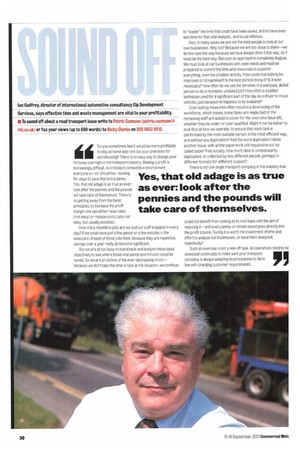Do you sometimes feel it would be more profitable to
Page 50

If you've noticed an error in this article please click here to report it so we can fix it.
stay at home and rent out your premises for warehousingP There is no easy way to change your fortunes overnight in the transport industry. Making a profit ls increasingly difficult, so in today's competitive environment everyone is—or should be—looking for ways to save that extra penny. Yes, that old adage is as true as ever; look after the pennies and the pounds will take care of themselves. There is no getting away from the basic principles: to increase the profit margin one can either raise rates (not easy) or reduce costs (also not easy, but usually possible).
How many repetitive jobs are we and our staff engaged in every day? If we could save just a few pence or a few minutes in the execution of each of those jobs then, because they are repetitive, savings over a year really do become significant.
But we are all too busy to stand back and analyse these tasks objectively to see where those vital pence and minutes could be saved. So we are all victims of the ever-decreasing circle— because we don't take the time to look at the situation, we continue to "waste" the time that could have been saved, and so have even less time for that vital analysis...and so ad infinitum.
Also, in many cases we are not the best people to look at our own businesses. Why not? Because we are too close to them—we do this task this way because we have always done it this way, so it must be the best way. But such an approach is completely illogical. We must look at our businesses with open minds and must be prepared to commit the time and resources to question everything, even the smallest activity. How could that activity be improved or streamlined? Is the best person doing it? Is it even necessary? How often do we use the services of a well-paid, skilled person to do a mundane, unskilled job? How often is a skilled technician used for a significant part of the day as a driver to move vehicles,just because he happens to be available?
Cost-cutting measures often result in a downsizing of the workforce, which means some tasks are neglected or the remaining staff are asked to cover for the ones who have left, whether they be under or over-qualified. Might it not be better to look first at how we operate, to ensure that each task is performed by the most suitable person in the most efficient way, and without any duplication? And the word duplication raises another issue: with all the paperwork still required in our socalled paper-free society, how much data is unnecessarily duplicated, or collected by two different people, perhaps in different formats for different outputs?
There is not one single transport company in this industry that could not benefit from looking at its cost base with the aim of reducing it—and every penny or minute saved goes directly into the profit column. Surety it is worth the investment of time and effort to analyse our businesses, or have them analysed, objectively?
Such an exercise is not a one-off task. All operations need to be assessed continually to make sure your transport company is always adapting its procedures to fall in line with changing customer requirements.








































































































































